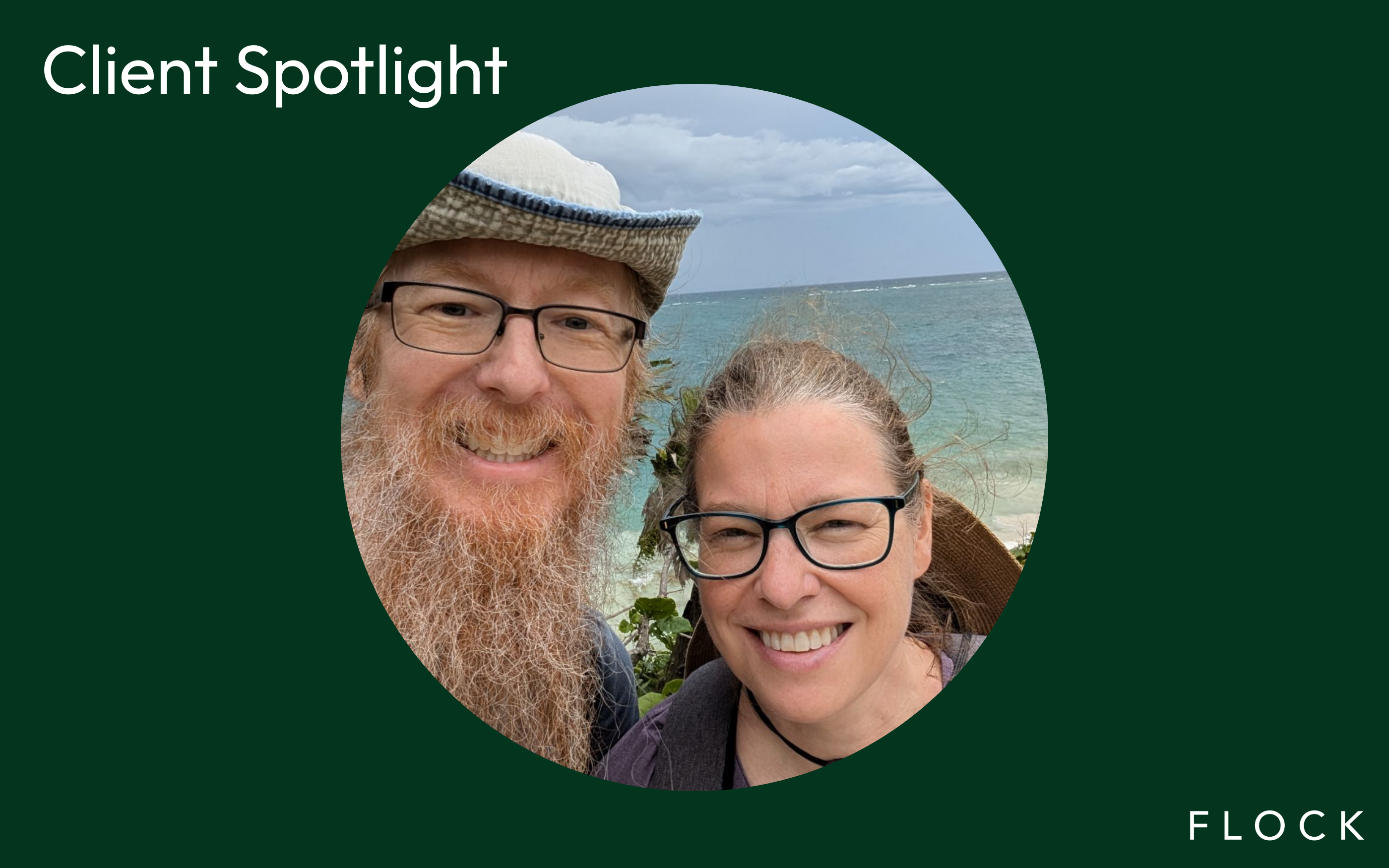7 Ways to Create Passive Income With Real Estate

Love the idea of earning money while you sleep? Who doesn't?
Fortunately, you don't have to be a social media influencer or Wall Street guru to make it happen. With the right plan, financing, and real estate know—how, you can turn your property investment strategy into a passive income money—maker.
And you don't have to wait, either.
We'll show you how you can start making passive income with real estate right now. Below, we'll cover:
- What Is Passive Income?
- Benefits of Passive Income Through Real Estate
- How to Make Passive Income With Real Estate
- Best Practices for Making Passive Income With Real Estate (Successfully)
- Start Making Passive Income With Flock
Not every real estate investment generates passive income. And some investments are more passive than others. Before we get into passive income real estate strategies, let's get on the same page about what passive income is (and isn't).
What Is Passive Income?
Wikipedia defines passive income as "a type of unearned income that is acquired automatically with minimal labor to earn or maintain." It's easy money, but what we don't often talk about is the upfront investment of time and money it takes to start making passive income.
The path to generating passive income is an investment. If the investment pans out, you eventually make more money with less input. But you have to put in the investment (read: risk) from the get—go if you ever want to make passive income down the road.
Another important point to touch on in that definition is "minimal labor." While passive income lets you live the dream and make money while you sleep, it's not usually a set—it—and-forget—it—forever strategy. It still requires a bit of work to maintain.
That work will be substantially less taxing than the time and energy necessary for hourly wages, salaries, and commissions—but it's still work. Start planning on that "minimal labor" now, and it'll save you heartache later.
Benefits of Passive Income Through Real Estate
Real estate is just one of many ways to make passive income. Why should you choose it over something else? Great question. Here are a few benefits that real estate passive income gives you:
- Inflation—Protected Investment: Real estate isn't inflation—proof, but it is one of the safer investments during periods of higher inflation.
- Multiple Income Streams: A single piece of real estate could provide you with rental income, tax write—offs, and capital gains. And if you invest in a trust, you get regular distributions and share appreciation. Not many investments provide so many different ways to make money.
- Increased Leverage: Boost your buying power to scale your investments faster and further by leveraging your current real estate properties.
- Risk Diversification: You can purchase different types of properties and invest in multiple geographic locations to diversify your real estate portfolio.
- Tangible Asset: Tangible assets provide higher stability. It's not a digital coin that can come and go. It's a physical piece of property that you own. It can't be hacked away (not really), and it won't disappear overnight.
How to Make Passive Income With Real Estate
There are plenty of ways to make passive income with real estate, but some take more work than others—and some require greater risks. Below, we'll break down 7 different passive income strategies and key details to consider.
1. Real Estate Investment Trust Distributions
Want to have truly passive income? Invest your money or trade your property for shares in a real estate trust.
This is as passive as it gets. You no longer have to deal with the traditional hassles of property ownership (marketing, tenants, maintenance, rent, etc.), and you make income from regular distributions.
You make money based on the performance of the homes in the portfolio, and these are much more likely to perform (in the short—term and long—term) well compared to owning a single property. Joining a more extensive portfolio means you get the benefits of diversification, efficiencies at scale, and professional management.
Plus, when you trade your property for shares in a trust, you can defer your capital gains tax. That means you grow your portfolio faster without losing up to 1/3 of your property's value on taxes and selling fees.
2. Real Estate Trust Share Value Appreciation
Joining a real estate trust doesn't just get you regular income—you also benefit from the portfolio's appreciation. As the portfolio grows and homes appreciate, your share value increases.
When you're ready to sell your shares, you can do this strategically to minimize your capital gains tax by selling when you're in lower tax brackets.
3. Short—Term Rental Income
Short—term rentals can net you a higher monthly income than shares in a trust or long—term rental units, but they require more hands—on work and can be risky.
When you have a tenant in a long—term rental, you know how much you're making every month—the same isn't true with a short—term rental property.
While you can get a property management company to manage the nitty—gritty work of your short—term rental, they'll eat into your profits. In the end, owning a short—term rental isn't usually very passive—it takes a lot of work.
4. Long—Term Rental Income
Long—term rentals provide a great way to make passive income. You'll have to do the upfront work to prepare the rental unit, market the property, and screen tenants—but things slow down once you have a tenant and a contract in place.
However, you'll still have to maintain the property, ensure timely repairs, collect rent, and stay in communication with your tenants. Sometimes, this doesn't take much work day to day or month to month—other times, it becomes a full—time job.
5. Capital Gains
Capital gains come from selling a property for more than you paid. For example, if you buy a property for $300,000 this year and sell it for $330,000 next year, you made capital gains of $30,000.
However, that doesn't mean you made $30,000 in profit. When you sell the property, you have to pay capital gains tax, depreciation recapture tax, broker fees, closing costs, and more. It can eat into a lot of your income.
Increasing the value of a home can be passive or active. Over time, real estate prices go up, so there's a good chance buying and holding a piece of property will end in capital gains (barring an economic decline or geographic risks). However, you might need to invest in upgrading and maintaining the property, which will take time and money.
6. Tax Write—Offs
You can write off taxes like depreciation, losses, and interest expenses every year. These might not seem substantial, but they can save you a fair amount of cash annually.
Residential properties take 27.5 years to depreciate, which means you can write off thousands come tax time. However, when you sell the property later, you'll have to pay taxes if you sell it for more than its depreciated value.
7. Rent Out Storage Space
Get a double—whammy on your rental income by renting out storage space. A platform like Neighbor can help you rent out your garage, RV bay, backyard, or even attic for stuff instead of people—just like you would with a paying tenant.
Best Practices for Making Passive Income With Real Estate (Successfully)
Even the best investments might not turn out the way you hope, but you can improve your odds of success by following a few best practices:
- Put in the Upfront Effort: Put in the hard work early to start making passive income later. That might be more financial planning, research, and conversations with potential partners—but you have to put in the effort first.
- Be Willing to Do Some Ongoing Work: Remember, passive income requires "minimal labor." Know what you're getting into before you go down a long investment path.
- Diversify Your Real Estate Investments: Know investment strategy is fool—proof. Don't put all your eggs in one basket. Diversify your investments (join a trust, purchase multiple types of properties, spread out to different locations) to protect yourself.
- Monitor Real Estate Trends: Things can change quickly in the world of real estate. Keep your eye on evolving trends and make plans so that you're never blindsided.
- Partner With a Professional: Real estate investing can be difficult and complicated. Fortunately, you don't have to do it alone.
- Partner with someone you can trust to manage the load.
Start Making Passive Income With Flock
Want the benefits of passive income without the hassles of traditional property ownership? Join Flock.
You simply exchange your rental property for shares in a portfolio of homes managed by Flock. You will receive regular cash flow, and your account will continue to appreciate as the portfolio grows and performs well.
Plus, joining Flock is a non—taxable event, which means you don't have to worry about capital gains tax or other seller's fees—you can reinvest that cash into your investment portfolio.
Interested? Learn more here.
.svg)
.avif)



.png)

.svg)